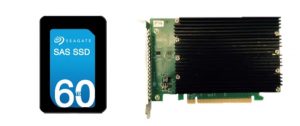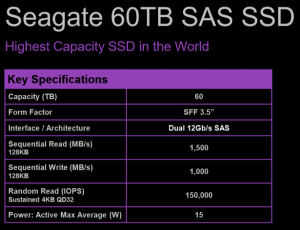Seagate’s latest SSD has a storage capacity of 60TB which is a clear indication that the company is looking to break off from the competition by introducing a solid state drive that dwarfs others on the market.
Now, before you log into Amazon and order one for yourself, you should know that currently, the 60TB SSD drive from Seagate is only announced for business use.
Since the chances of you running your own business AND wanting a 60TB SSD drive are minimal, we’ll go out on a limb here and say, that you won’t be seeing Seagate’s latest SSD device anytime soon.
Make no mistake, the size of Seagate’s recently announced 60TB SSD is colossal. In fact, it is the largest solid state drive that is available today. There is hardly an SSD device that can boast a size even close to 60TB.
As mentioned before, regardless of the fact if anyone would want to buy a 60TB SSD, you can’t purchase the 60TB SSD because currently, the product is only meant for businesses.
The 60TB SSD looks set to become another great addition to Seagate’s already impressive data center portfolio.
To get a clear perspective on how big Seagate’s 60TB SSD really is, know that the next largest SSD in the market is about four times smaller than Seagate’s 60TB SSD.
Furthermore, the 60TB SSD from Seagate can store about 12,000 DVD movies safely. If that’s not your thing, then the 60TB SSD from Seagate can also hold 400 million photos. Seagate didn’t comment on how it calculated the “400 million” photos figure since the average size of a photo can vary drastically depending on its resolution and quality among other factors.
Have you been impressed yet? Let there be no doubt; Seagate’s 60TB SSD is truly gargantuan in size. You might be tempted to compare that size with 30 of your regular 2TB drives, but you’ll be mistaken because as the title of this posts clearly states that Seagate’s 60TB storage device is actually a solid state drive.

Seagate 60TB SSD will be the largest capacity SSD device in the world and will only be available for business use
That means that it will be at least 15 times faster than your regular 2TB drive in terms of read/write/access speeds.
It has been reported that the 60TB SSD from Seagate was manufactured with accessibility in mind. Not only that, the manufacturers wanted to make sure that businesses could access and store significant amounts of data quickly.
The solid state drive’s architecture, reportedly, is very flexible in the sense that the device will make it easier for big data centers to expand their storage capacity from 60TB to 100TB if a need arises in the future.
Seagate’s 60TB SSD would easily accommodate more data for future needs by using a similar form factor. A form factor is simply the physical size of the storage device.
And if “for business use only” put you off in the beginning then the next bit is going to hurt even more.
Seagate has also said that, at the moment, the 60TB SAS SSD device is only available for demonstration purposes.
Yes, you can’t buy the Seagate 60TB SAS SSD drive even if you were to use it for a business need. Seagate has said that the massive 60TB SAS SSD will be available in the market sometime in 2017.
Additionally, no one has actually seen the drive itself. In other words, right now there is no information about how big or small the SSD would look considering its mammoth size of 60TB.
Those outraged at the unavailability of the 60TB SSD device should ask themselves if they would ever need such amount of space in SSD format.
And, perhaps more importantly, what would a 60TB SSD cost to the consumer?
Right now, you can buy a 4TB SSD for around $1500, so theoretically a 60TB SSD device would cost you around $20,000.
You’re way better off paying the advanced deposit amount ($1000) for twenty of those sweet Tesla Model 3 electric cars.
But not all is lost since about a month ago Seagate also unveiled a 10TB hard drive for home users. A 10TB storage hard drive could certainly prove useful to home users who run a server and people who like to store a lot of games and 4K videos.
The 10TB Barracuda Pro, in contrast to the new 60TB SSD from Seagate, was a pretty standard drive except for its storage capacity.
Seagate’s 10TB Barracuda Pro is essentially a 3.5-inch 7200 RPM disk drive, but its 10TB capacity truly sets it apart from other drives which can’t be used for home servers.
The 10TB Barracuda Pro, Seagate announced, would cost consumers around $550. That figure alone should be enough to scare off prospective buyers who want to get their hands on Seagate’s other hard drive i.e., the 60TB SAS SSD device.
Perhaps the more moderate of home users would go for something like Samsung’s fastest SSD 950 Pro.
The 950 Pro is a consumer grade SSD that fundamentally transforms vertical NAND (or V-NAND) technology into a much smaller M.2 PCI Express device.
As a result, Samsung 950 Pro can read at speeds that are 20 times faster than your average hard disk drives.
The 512GB model of Samsung’s 950 Pro can read at 2.5GB/S and write at 1.5GB/s which is a considerable bump from Samsung’s previous fastest SSD, the SM951 SSD.
The Samsung 950 Pro will cost consumers around $350. So if Seagate’s 60TB SSD aims to deliver a similar level of performance, then it would cost around $42000.
Certainly not an amount that a home PC user would be willing to shell out on a storage device.
But Samsung’s 950 Pro does make use of NVMe (Non-Volatile Memory Express) which is basically an interface that is specifically designed for SSDs to make them more power efficient and durable.
These storage drives also use Samsung’s 2nd-generation 32-layer V-NAND. That could also be the reason why the Samsung 950 Pro costs $350 for its 512GB model. The 256GB model will be made available for around $200.
All of this doesn’t bode well for the price Seagate would demand for its 60TB SAS SSD device which is slated to debut officially sometime in 2017.
- How to Pair a Vizio TV to Bluetooth Speakers – Quick and Easy - March 28, 2022
- How to Update iPhone Without WiFi - March 17, 2022
- What Is the Need for Businesses to Invest in Hiring for Java Development? - March 14, 2022

